| Srl | Item |
| 1 |
ID:
087832


|
|
|
|
|
| Publication |
2009.
|
| Summary/Abstract |
This article examines the EU's partnership with the UN in building effective multilateralism through an analysis of the EU operations in the Democratic Republic of Congo (DRC) between 2003 and 2006. The EU has offered a range of tools in the field of civilian and military crisis management to MONUC, the UN Organization Mission in the DRC, thus representing the first case of full partnership on the ground between the two organizations. This pioneering peace operation can offer insights into possible future collaboration between the two organizations in peace and security matters. The argument of the article is that it is possible to establish a 'partner model' from the example of cooperation in the DRC: in the case of a UN deficit, the EU may intervene as supporting organization. However, since the EU is keen to be considered as an independent global actor, it seems focused on a pragmatic rather than institutionalized approach in its cooperation with the UN.
|
|
|
|
|
|
|
|
|
|
|
|
|
|
|
|
| 2 |
ID:
092131


|
|
|
|
|
| Publication |
2009.
|
| Summary/Abstract |
This article analyses the ways in which rapidly emerging narratives of EU-UN cooperation in military crisis management are rewriting and re-authorizing European practices of military intervention in Africa. By problematizing the underlying assumptions, this article points to the increasing significance of uncertainties about the location of contemporary political life, the location of 'crisis management', and thus to the diverse effects of a crisis management approach to African conflicts. Hence, this article problematizes and challenges a range of powerful normative claims about 'EU crisis management'. The emerging narratives are practices of knowledge and space that shape EU-Africa relations and that create new spaces of intervention, thus establishing and enabling relations of authority and control. Last, the article discusses briefly how such practices worked in the case of EUFOR Tchad/RCA (European Forces in Chad and the Central African Republic).
|
|
|
|
|
|
|
|
|
|
|
|
|
|
|
|